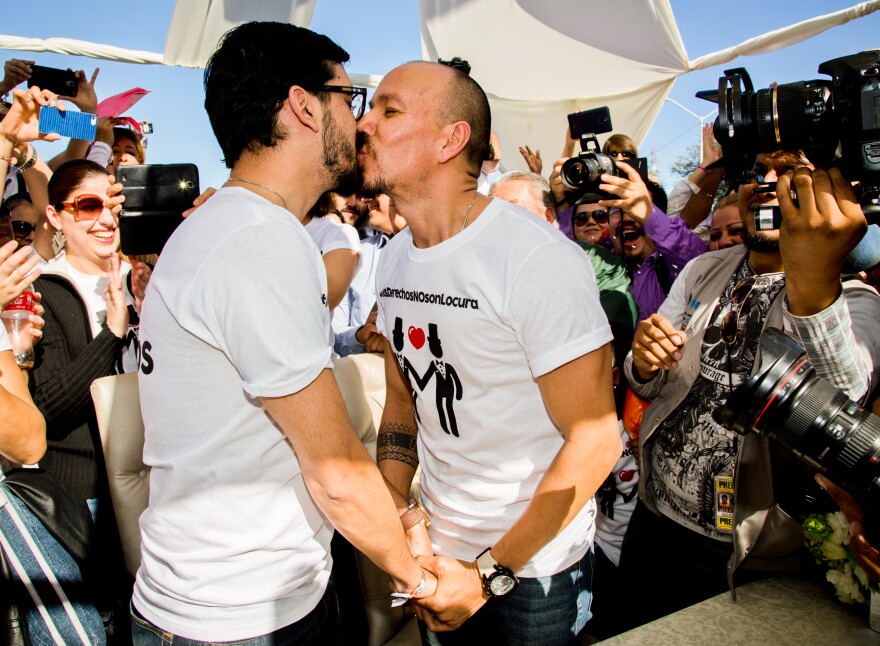In the U.S., the Supreme Court's widely anticipated ruling on same-sex marriage has been the focus of nonstop speculation and debate. In Mexico, meanwhile, the highest court effectively legalized same-sex unions this month with a decision that was so low key many failed to notice.
Mexico's Supreme Court quietly published an opinion, known as a jurisprudential thesis, ruling that defining marriage as a union only between a man and a woman is discriminatory and in violation of Mexico's constitution.
While the court did not explicitly say that same-sex unions were legal, the decision is seen as having that effect. And this month's ruling follows a number of court decisions in the past year that pointed in the same direction.
Same-sex marriage has been advancing steadily in Latin America. Argentina was the first to legalize it, in 2010, followed by Brazil and Uruguay. Others have been taking steps along this path.
Until recently, it had been extremely difficult for same-sex couples to be wed in Mexico, as Victor Manuel Aguirre and Fernando Urias know all too well.
Speaking by phone from their home in Mexicali, just across the border from Calexico, Calif., Aguirre says the couple tried four times in the past two years to marry at city hall.
Each time they were confronted by protesters, hostile local officials and legal obstacles. They finally took their case all the way to Mexico's highest court, which ruled in their favor. They were wed on Jan. 17.
"After so much troubles," Aguiree says with a laugh.
Prior Rulings
This case and a series of other successful challenges to state bans on same-sex marriage prompted the Supreme Court's ruling this month. However, the Supreme Court decision did not go so far as to invalidate state laws. Local city clerks can still refuse to grant a marriage license to same-sex couples.
Fernando Urias says the ruling is not perfect, but "it will be much easier and much faster than it was for us. Now couples won't have to do all we did."
Couples denied marriage licenses can now directly appeal to local judges who will be bound by the Supreme Court ruling and must force local clerks to issue the license.
"No judge can exclude same-sex couples from marriage in any part of the country," says Estefania Vela Barba, an associate law professor in Mexico City.
She says the Supreme Court justices particularly objected to state laws that determined the purpose of marriage as procreation. Vela Barba says the court ruled such statements as incorrect and discriminatory.
"So for all purposes, there is no reason to exclude same-sex couples from marriage because they can perform what marriage is about ... helping each other out," she says.
But in Mexico, where more than 80 percent of the country is Catholic, such statements don't sit well with many. The Catholic Church reportedly objected to the ruling, saying it goes against the basic family structure founded on the marriage of a man and a woman.
Victor Aguirre and Fernando Urias in Mexicali say they are bracing for a backlash. The two were attacked and robbed at their business three months after marrying.
Despite what they both say is a tough road ahead in the fight for gay rights and acceptance in Mexico, "We've done something good for our society," says Urias.
Copyright 2021 NPR. To see more, visit https://www.npr.org.



